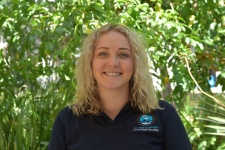

Magena Marzonie
magena.marzonie@my.jcu.edu.au
PhD
ARC Centre of Excellence Coral Reef Studies

Magena Marzonie
magena.marzonie@my.jcu.edu.au
PhD
ARC Centre of Excellence Coral Reef Studies
Environmental and genetic drivers of heat tolerance in corals
Magena grew up in Colorado, USA, where she completed her BSc in Biology and Chemistry. Her passion for scuba diving and marine environments naturally led her to Townsville where she completed her MSc in Marine Biology, followed by a position at the Australian Institute of Marine Science (AIMS) where she worked on coral hybridisation projects. Her research has ranged from assessing the effects of heavy metals in rivers to assisting with selective breeding experiments in corals. Now, Magena is pursuing a Doctor of Philosophy at AIMS and JCU to investigate drivers of heat tolerance in corals.
Environmental and genetic drivers of heat tolerance in corals
2020 to 2024
Project Description
Magena's project aims to investigate the environmental and adaptive processes that influence heat tolerance in corals and their response to recurrent marine heatwaves. This project specifically seeks to identify the roles of environment, coral symbionts and host genetics on thermal tolerance in corals.
Project Importance
Coral bleaching is now a principal threat to the health and function of coral reefs, and bleaching is expected to occur every year by mid-century. Identifying the main drivers that influence heat tolerance will not only enable more accurate predictions of high and low tolerant populations but can also provide a framework for management, restoration and conservation efforts to mitigate bleaching.
Project Methods
Magena's project uses manipulative, field-based acute heat stress experiments to identify bleaching phenotypes of corals. Bleaching phenotype scores derived from experiments will be combined with environmental disturbance data and molecular sequencing of both coral symbionts and host to identify patterns associated with thermal tolerance.
Project Results
After field-based, heat stress experiments in the Coral Sea, we have identified marked differences in heat tolerance between species and among populations at eight distinct reefs. The high variability in bleaching tolerance has fuelled the trajectory for future chapters to understand the drivers of bleaching variation, including what patterns and processes are driving these spatial trends.
Keywords
Climate change,
Coral reefs,
Corals,
Distribution,
Ecology,
Field based,
Genetics,
Interaction,
Management tools,
Manipulative experiments,
Microbiology,
Molecular techniques,
Natural disturbance,
Ocean warming,
Physiology,
Quantitative marine science